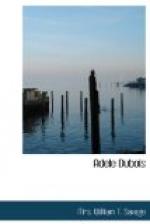“Not quite”.
“What do we want of the dry bones of the saints, when we have memoirs of their precious lives? They would themselves spurn the superstition that consecrates mere earthly dust. It nauseates me to think of it”.
“Procedez, ma fille”.
“My friend from the States, Mabel Barton, came to the convent, the day I arrived. As our studies were the same, and as, at first, we were both homesick, the sisters permitted us to be together much of the time. Eh! bien! I read her books, her Bible, and so light dawned. She used to pray to the Father, through the Redeemer. I liked that way best. But ma mere, our cathedral service is sublime. There is nothing like that. Now you will forgive me. The arches, the altar, the incense, the glorious surging waves of music,—these raised me and Mabel, likewise, up to the lofty third heaven. How high, how holy we felt, when we worshipped there. Because I like the cathedral, you will forgive me for all I said before,—will you not, ma chere mere?”
Turning her head suddenly towards her mother, Adele saw her eyes filled with tears.
“Eh! ma chere mere, pardonnez moi. I have pained you”. And she rose and flung her arms, passionately, around her mother’s neck.
“Pauvre fille!” said the mother, returning her embrace mournfully, “you will wander away from the church,—our holy church. It would not have been thus, had we remained in sunny Picardy. Eh! oublier je ne puis.”
“What is it, chere mere”, said Adele, “that you cannot forget? There is something I have long wished to know. What was there, before you came here to live? Why do you sometimes sit and look so thoughtful, so sad and wishful? Tell me;—tell me, that I may comfort you”.
“I will tell you all, Adele, yes,—all. It is time for you to know, but—not to-night—not to-night”.
“To-morrow then, ma mere?”
“Yes. Yes—to-morrow”.
CHAPTER X.
PICARDY.
“Weep ye not for the dead, neither bemoan him: but, weep sore for him that goeth away: for he shall return no more, nor see his native country”. The prophet, who wrote these words, well knew the exile’s grief. He was himself an exile. He thought of Jerusalem, the city of his home, his love, and his heart was near to breaking. He hung his harp upon the willow; he sat down by the streams of Babylon and wept.
The terrible malady of homesickness,—it has eaten out the vigor and beauty of many a life. The soul, alien to all around, forlorn amid the most enchanting scenes, filled with ceaseless longing for a renewal of past delights, can never find a remedy, until it is transplanted back to its native clime.




